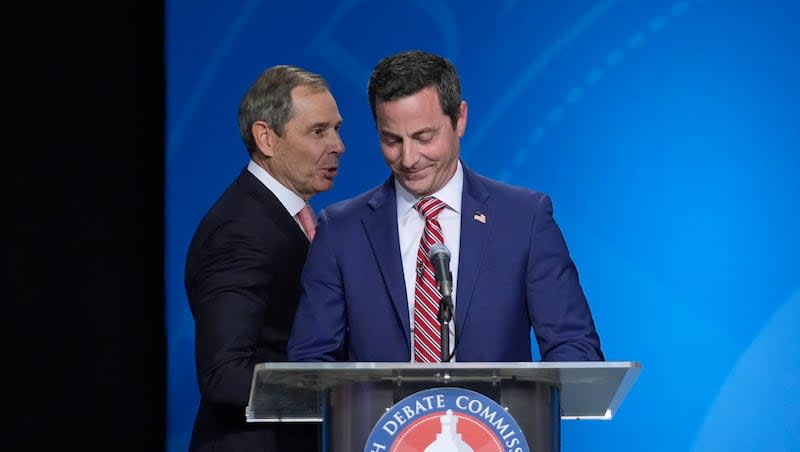The day after: Rep. Curtis responds to Staggs stock accusation from Senate debate

Riverton Mayor Trent Staggs accused Rep. John Curtis of benefiting from his position through stock trades in the final moments of the Senate Republican primary debate on Monday evening.
Here’s what Staggs said, how Curtis responded and what the record shows about Curtis past investments.
What did Trent Staggs say about Rep. John Curtis at the debate?
In the last minute of a nearly hour long debate, Staggs used his closing statement to verbally attack the polling frontrunner in the race to replace Sen. Mitt Romney.
“On March 4 of 2020, Abbott Laboratories was awarded a federal grant. On that same day, John Curtis purchased stock in that company,” said Staggs, who won the GOP convention nomination. “This is the problem in Congress. At a time when somebody should be looking out for their constituents, they end up looking out for their own profit. That’s why I’ve signed a contract with Utah. I want to ban the trading of individual stocks for members of Congress and their families.”
Following Staggs’ remarks, Curtis interrupted the debate moderator who was wrapping up the event to respond to the personal attack. Curtis said Staggs had waited until he would not have time to respond to insert his allegation of what Curtis later called “insider trading.” Staggs did not say Curtis committed a crime.
“That is such a low shot. You wait till I have no response. You throw something out I can’t respond to. You’ve accused me of a felony here tonight. You better have very good evidence. And I’d like to challenge you to produce that evidence that somehow I’ve committed a felony,” Curtis said looking directly at Staggs. “If that’s how you’re going to work in the Senate, the people of Utah would be very disappointed.”
After the debate, Curtis told reporters he “tried a number of things” to insulate himself from criticism over his financial holdings. “I tried a blind trust, a whole bunch of things. And none of those things have worked. And so my conclusion is part of the price of service is to divest yourself of those things. And that’s what I’ve subsequently done.”
Was Staggs’ accusation against Curtis true?
Staggs misspoke during his criticism of Curtis, his campaign confirmed. The 3rd District congressman did invest in Abbott Laboratories, but not on March 4, 2020.
On March 27, the U.S. Food and Drug Administration publicly announced they gave emergency use authorization for Abbott Laboratories to produce a new coronavirus testing system. That same day, Abbott Laboratories stock was purchased in Curtis’ name, according to a monthly “Periodic Transaction Report” produced by the U.S. House of Representatives and signed by Curtis on April 9, 2020.
Staggs likely mixed up the Abbott Laboratories investment with Curtis’ purchase of Zoom Video Communications, Inc. stock on March 4, which experienced a surge in stock prices as COVID-19 spread, a campaign spokesperson said.
In April of 2020, a watchdog group filed a complaint with the Office of Congressional Ethics to investigate Curtis’ pandemic-related investments. The office declined to open an investigation into the accusations, Curtis’ campaign manager said at the time.
Curtis did not make these stock purchases directly, according to his chief of staff, Corey Norman. They were made by Private Client Services, a financial advising system that is part of the Northwestern Mutual Wealth Management Company.
“This is a desperate and dishonest attack by a failing campaign,” Norman said in a statement to the Deseret News. “As a Congressman, John has always followed all legal and congressional rules for investment decisions which are publicly disclosed through the House Ethics Committee and can be reviewed by any member of the public. The stock in question was made independently by PCS which was managing John’s portfolio.”
Does John Curtis still own stocks in Abbott Laboratories?
Curtis has divested himself of individual stocks, he told reporters after the debate. As a businessman prior to entering politics, Curtis said he had invested in stocks and later as a first-time candidate.
A congressional stock tracker shows Curtis with scattered investment activity until Dec. 4, 2023, when Curtis sold his shares in nearly 60 different stocks. Norman confirmed that Curtis sold out of all of his individual stock positions at the end of last year.
An analysis done by The New York Times in 2022 found that Curtis was one of 97 members of Congress that had bought or sold stocks that intersected with their areas of legislative oversight.
Following the debate, Staggs doubled down on his closing statement. “It’s factual,” he said. “We need to be able to ban the trade of individual stocks from members of Congress. I don’t think it’s right.”
Curtis agreed that congressional conflicts of interest with the stock market could present a problem. Trading stocks hasn’t been banned for members of Congress because investment alternatives, including bundled investment tools like Exchange-traded funds (ETFs), would have the same problems, Curtis said, and because forcing members of Congress to sell their stocks all at once would create a “huge taxable event” for them.
“Well, is that the cost of serving in Congress? That’s fine if it is. But that shows some of the complications of why Congress actually hasn’t acted on this,” Curtis said.

